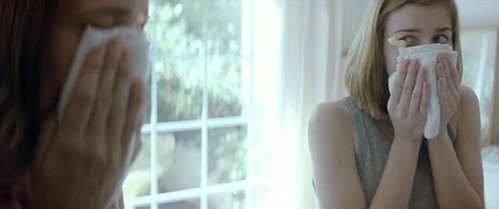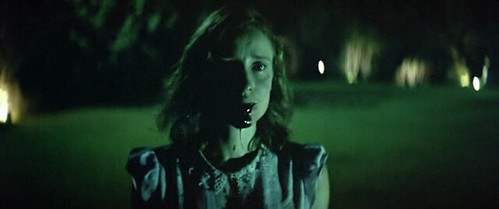Viewing Log #81: Dogtooth [Giorgos Lanthimos, 2009]
by Ryland Walker Knight

—The only audience for philosophy is the one performing it.
One of those ugly films that looks beautiful, Dogtooth a trouble maker. That is, it's difficult. Abusive and about abuse, controlling and about control, and all kinds of weird in the sexual arena save the hilarious swap of meanings where, at this compound's dinner table, "pussy" means "lightbulb" and, in the bedroom, a lady calls her vagina a keyboard. (My not wanting to use "pussy" twice is another odd linguistic/cultural impulse worth looking into another time.) The film starts with a lesson in words, in fact, with a tape recording made by the mother defining new meanings for words anybody "with language" should already know; so from the start we've got a film about education awry. But this picture of children finding meanings for themselves within a totalizing system they cannot control isn't just an unlearning, nor some new light shone, but a more basic urge—I want to say compulsion—in the human to sublimate one's every day. It just takes more drastic actions, with greater consequences, when one's every day is defined in terms that are outright wrong, plainly false. The exciting thing is Dogtooth doesn't try to redefine the terms for you; the troubling thing is it doesn't exactly open the world.
Such is the risk of the metaphysical, I suppose: languages make the everyday in concrete actions every day. The best way I can describe what I'm failing to say here, because I want these posts to be as quick and dirty as possible, is, and this is a huge idea to toss off in a goofy little blog post, that you learn a language by speaking it, not reading it or writing it. That old game of praxis versus theory. Which is another long-winded way of saying, inside all the gorgeous and irregular compositions in the film, there's a course-load of philosophy to elucidate for those inclined. Not being a grad student, I don't plan to go into it here. But I would gladly read certain people's papers (that ignore the qualitative aspect of criticism) on this film and its ideas. What really got my brain going, to be honest, was that the movies (both home and Hollywood) are manifestly a big part of the education herein. But we don't see the Hollywood ones (though there are grainy clips of the home videos), we see static on the TV and we see a performance, a "third-party" representation/reproduction/redescription as part of our understanding of the worlds colliding inside one tough lady's body and soul.





This film works much better when you don't summarize it, either in your mind while watching it or in a piece while writing about it, I think. The concreteness of the elements just isn't represented well by placing them within a fluid continuum, no matter how many justifications are laid out. Even though I love the film, some neutral descriptions of it leave a bad taste in my mouth and others make me remember how great it is. It's all about putting it in the right perspective, as may always be the case but especially in this case.
ReplyDeleteHere's a question: Given a real scenario such as this, how do you think the eldest would react if she saw this film instead of Jaws? What kind of 'education' would Dogtooth be in such a situation? It's easy to say that she would realize that what her parents are doing to her is the same thing that the parents are doing in the film, but would the film actually prompt that awareness? I think not, unless indirectly through paranoia (which may not be a reasonable expectation, given my own ability to pass it off as 'about those other people'), and even that is unsettling. In fact, if seeing Jaws and Rocky opened the daughter in the film up to outside perspectives that in the end didn't see her finding any positive resolution, maybe the film would serve as a warning against believing outside information. In its own strange way it may end up reinforcing the isolationist tendencies. It's all about perspective, in the end. I don't know if that's a good thing or a bad thing. New justification for false Hollywood happy endings: 'If Dogtooth had a happy ending then any child who was able to watch the film under similar conditions may have been compelled to escape! Think of the children! Or adults, as the case may be.'
Given that you seem to have reacted positively to Dogtooth, have you checked out The Temptation of St. Tony? They're both similarly bizarre, with a healthy dose of mad black humor, and one has Denis Lavant on a mini accordian.
Dug this movie. An example of, like, terminus films. An idea, or system, or logic, drawn out and lead to one likely (but one of many) conclusions. Plus, anything with language play (I mean, c'mon: "A pussy is... a big light.") is going to thrill me. The weird Haneke flat violence, gorgeous frames, abuse through omission: all right up my alley.
ReplyDeleteCouldn't find your email but judging from your thoughts on this movie, I think you may want to check out "The Matchstick Girl". You can view the trailer here - http://vimeo.com/21992092. An igniting fantastical tale where, in her solitude and deprivation, the Matchstick Girl follows a meandering pathway deeper into the pit of her own mind, passing through three hallucinogenic worlds.
ReplyDelete